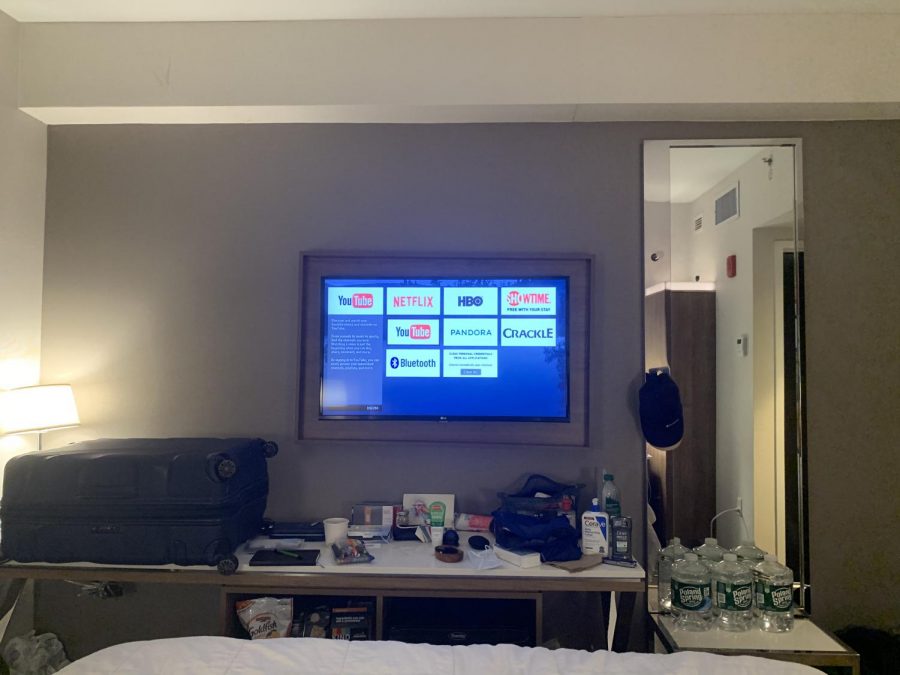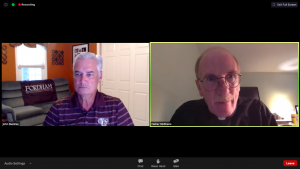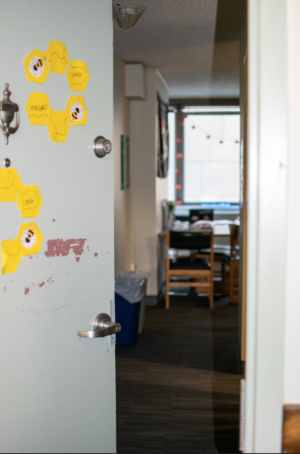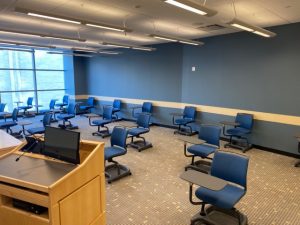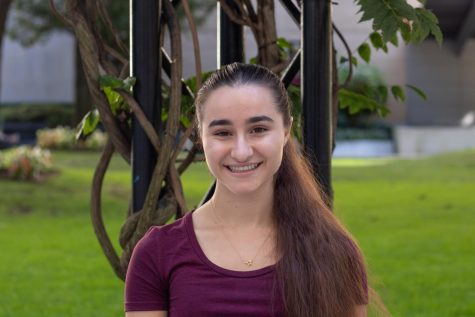Quarantining Off-Campus
Students from NY restricted states must quarantine for 14 days prior to campus entry
COURTESY OF MATTHEW KOZAKOWSKI
Matthew Kozakowski, FCLC ’21, from California, accepted the incurred costs of staying in a hotel in NYC. He said he found the experience stressful as he had to make accommodations quickly after Fordham released its quarantining guidelines.
August 14, 2020
Students coming to Fordham’s campuses from one of 30 restricted states must quarantine for 14 days before entering campus. The Fordham community received detailed information about the quarantine expectations in an email on July 27 from the Office of the President.
Students have three options: to reserve a hotel within an approved area by the university, to remain home and take classes online until their state moves off of the restriction list, or quarantine in a private home in a non-restricted state.
“For about a week, I was scrambling, considering many options and frantically trying to communicate with my friends and suite-mates to figure out what Fordham meant,” Cooper Wilson, Fordham College at Lincoln Center (FCLC) ’23, said.
Originally, Wilson was planning to live on campus and attend in-person classes for the fall semester. Since Wilson is from California, a designated quarantine state by the state of New York, he had to reconsider his plans for moving in following the July 27 email.
“The most problematic detail was and is that we aren’t allowed to quarantine in the dorms,” he said.
In the email, the university stated that there is a possibility for students to quarantine on campus; however, that decision was awaiting acceptance from the New York State Department of Health. Only a small group of early move-in students, such as Orientation Leaders and ResLife staff, were allowed to quarantine in their dorms, as long as none of their other suitemates had moved in yet.
In a recent update from the university, it was confirmed that quarantining on-campus is still not an option for students as New York state requires a private room and private bathroom, which the university cannot provide yet.
“Fordham only suggested waiting until our states were off the list or renting a hotel, which would have been prohibitively expensive with no help from Fordham,” Wilson said.
Fordham provided a list of close by hotels in the NYC area for students to stay in during their quarantine period. However, the university did not address the added financial burden that students may accumulate by staying in a hotel.
From the suggested hotels in the NYC area that the university provided, the average additional cost a student would have to incur with a 14-night stay in one of these hotels is at least $2,789 — which is almost 17% of the room and board cost for one academic year at FCLC.
Additionally, two of the hotels on the list provided are not accepting any reservations until after September due to the coronavirus (COVID-19), and four out of the seven are booked out until at least October.
Students can still locate their own hotel in an area of their choosing, as long as it does not reside in a restricted state.
NYC Test and Trace Corps has a program, Take Care Hotels, that is available to New Yorkers who test positive and may have been exposed to the virus, or for travelers from restricted states.
If a person meets qualifications for the program, the benefits include a 14-day hotel stay, transportation to medical appointments, onsite COVID-19 testing, three meals catered to dietary restrictions, interpreter services and onsite health care services — all free of charge.
Fordham did not make any of this information apparent to students in its emails released or on its website.
Wilson considered withdrawing from housing and moving off-campus instead to avoid paying for a hotel and to alleviate himself from the stress of the unexpected changes with on-campus living.
“In the end, one of my friends’ cousins offered up his apartment for us to quarantine, which is realistically the only reason I am able to come back to on campus living,” he said.
Another student, Matthew Kozakowski, FCLC ’21, from California, accepted the incurred costs of staying in a hotel in NYC. Kozakowski was not aware of Take Care Hotels until he received a phone call from the NY state government informing him of the quarantine requirements as an out-of-state traveler. This was after he had already begun his stay in a NYC hotel and paid for the expenses.
Kozakowski said he had a stressful experience booking a hotel and plane ticket last-minute after Fordham’s delayed communication. He didn’t get his housing assignment until Aug. 6, only four days before he was expected to begin the two-week quarantine in order to have it completed by the expected move-in date, Aug. 24.
“I didn’t buy/book anything before I got my housing because there was no guarantee we would be able to return to campus for classes or to the dorms to live,” he said. “I think most people would agree that I’m not going to invest that money and risk losing it.”
To make the process more manageable for students, Kozakowski expressed the need for a checklist sent out to out-of-state students planning on returning.
“That would’ve reduced my stress, put me and my parents at ease in terms of my safety in the city and given me something reliable and official to reference while navigating transcontinental travel during a pandemic,” he said.
Sheridan Tyson, FCLC ’23, is from Chicago, Illinois, and was set to move back to campus until she found out that Illinois was added to the restricted states list on July 28.
Tyson said that her family had previously planned a trip to Nantucket, Massachusetts, at the end of the summer before going back to Fordham. Her family was able to readjust their duration of the trip to stay the extra weeks to quarantine in Massachusetts and then move on campus.
“I’m really grateful to be in a position where this is not a big financial burden for my family,” she said. “That said, obviously my family is spending more money on just getting me to Fordham (paying those extra days/nights in MA) than we expected.”
Students are also worried about not receiving a partial refund for room and board after the university transitions to an online format following Thanksgiving break. On the website for COVID-19 Updates: Frequently Asked Questions, it says that “The University will refund the housing fees on a pro-rated basis for anyone who moved out in the first 2 weeks of the semester and then refunds will be given according the published refund schedule.”
The refund schedule provides a partial refund up until the fifth week after move-in; following the fifth week there is no refund. However, it is not confirmed whether the university will change its policy given the evolving situation.
Kozakowski said he is disappointed by the lack of sensitivity to students’ time and financial situations apparent in Fordham’s communication during these past few months, especially for a Jesuit school that stresses the importance of caring for students.
“Transparency is nothing to be scared of, Fordham,” Kozakowski said.
Despite the inconvenience of traveling from a restricted state, some students say the trouble is worth it.
“I learn so much better in an environment set up for learning, not crammed into my parents’ home,” Wilson said.
Kozakowski, who is a part of the Honors Thesis in Psychology program, said that meeting with advisers, conducting research and collaborating to write the thesis are all necessary for his courses. He was also worried about taking online courses on the west coast that are conducted in Eastern Standard Time.
“Being three hours behind felt like such a disadvantage when completing the Spring 2020 (semester),” he added.
Tyson said that she hopes to forge stronger bonds with her roommates this year, and coming back will be a big part of that. An even greater motivator for her is the desire to take advantage of NYC.
“Since the city is a huge part of the Fordham experience, I decided to go back so I could still enjoy everything the city has to offer,” she said.

